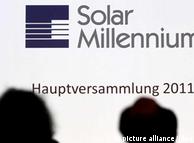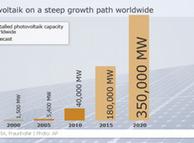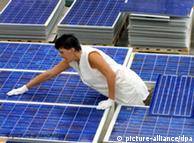The recent failure of yet another German solar energy firm has highlighted the difficulties the industry faces. Overcapacity and plunging prices have thrown the once promising sector into crisis mode.
The insolvency filing of Germany's Solar Millennium on Wednesday is yet another in a string of bankruptcies hitting the sector, and probably won't be the last.
Just a week before, Berlin-based Solon also threw in the towel and other firms, such as Conergy from Hamburg, Bavaria's Phoenix Solar and one-time wunderkind Q-Cells, are all deep in the red.
But the solar industry's troubles are not limited to Germany. In the United States, SES, Evergreen and SpectraWatt have also gone bankrupt. Solyndra, a firm that received a $535 million loan guarantee from the US government as part of its economic recovery program, filed for Chapter 11 in September, leaving Washington on the hook for the loan and hurting President Barack Obama politically.
 Solar Millennium was another domino to fall
Solar Millennium was another domino to fall
Experts blame the mass die-out on overcapacity as well as subsidies and dumping prices by Chinese manufacturers.
In October, the American subsidiary of the German firm SolarWorld and other US solar firms submitted a petition to the US trade commission and the World Trade Organization accusing the Chinese of unfair trade practices, citing a raft of Chinese subsidy programs for its solar industry, which they say violate free trade rules.
The firms accuse Beijing of providing low-interest loan guarantees for its homegrown solar sector in the range 21 billion euros and setting prices for exports that are up to 30 percent under manufacturing costs.
Subsidy race
But many in Germany forget that its own domestic solar industry has been strongly subsidized as well, if indirectly. Feed-in tariffs, which were first established by in Germany's Renewable Energy Sources Act (EEG) of 2000, have provided strong incentives for renewable energy generation, especially to small and medium-sized energy firms.
 In addition, towns with weak economies, largely in eastern Germany, lured many solar firms to set up shop in their regions with generous tax-breaks and grants.
In addition, towns with weak economies, largely in eastern Germany, lured many solar firms to set up shop in their regions with generous tax-breaks and grants.
Still, the situation in China is different than in Germany, according to David Wedepohl of the German Solar Industry Association. In China, only Chinese firms have access to the government's loan guarantees.
While foreign firms, such as Sharp and First Solar, have been able invest in Germany and get easy access to markets, in China foreign firms have been largely shut out of that country's domestic market, Wedepohl told Deutsche Welle.
Overcapacity
In addition, many solar firms – and not only German ones – are suffering under rapidly falling prices resulting from overcapacity. Especially in Asia, production facilities have expanded more quickly than the global photovoltaic market.
 Overcapacity has caused module prices to plummetSeveral European countries have recently cut back on existing subsidies for solar power, further hurting companies' bottom lines. Even in Germany, feed-in tariff rates are set to decrease annually.
Overcapacity has caused module prices to plummetSeveral European countries have recently cut back on existing subsidies for solar power, further hurting companies' bottom lines. Even in Germany, feed-in tariff rates are set to decrease annually.
Falling demand in Germany has not been balanced by any kind of uptick in exports. According to Wedepohl, solar module prices have fallen by one half since 2008.
Stocks have plunged across the solar sector as companies struggle for market share. Solar World's shares hit lows this week in Frankfurt, trading at around 3 euros, far below the almost 12 euros earlier this year and nearly 70 euros in 2007.

No comments:
Post a Comment